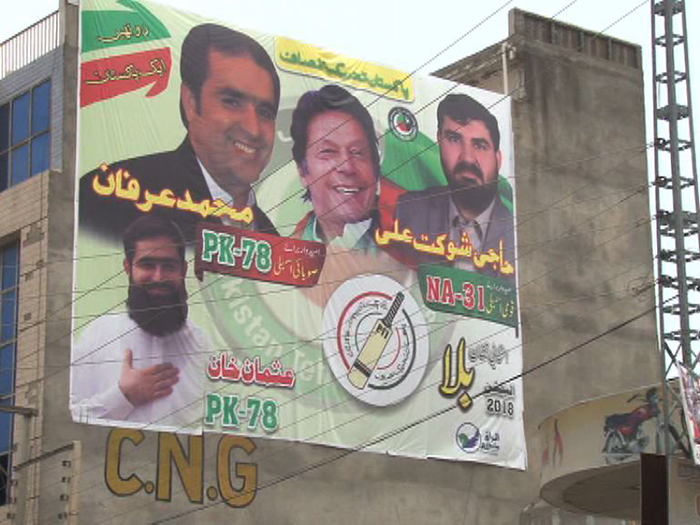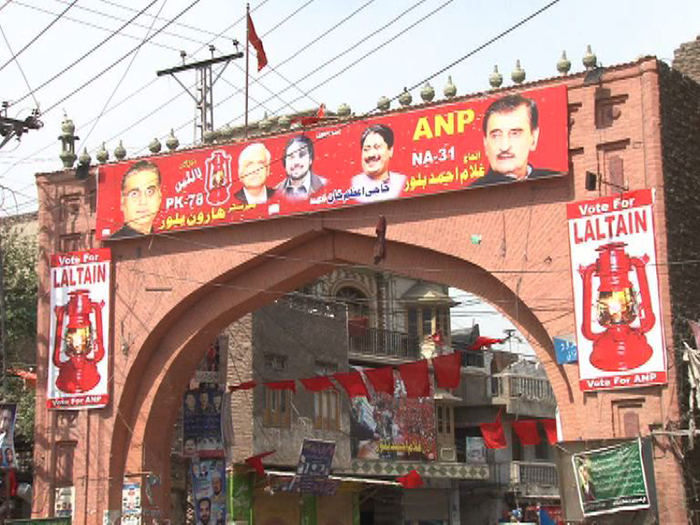There is a strong impression that the Pakistan Tehreek-e-Insaf (PTI) will sweep the northern Khyber Pakhtunkhwa province yet again. In the previous election cycle, it won 16 national out of 35 and 33 provincial out of 124 constituencies in the province. But impressions can be wrong, and so can even the most comprehensive surveys and estimates by political wonks. Why? Because voters are unpredictable and some politicians are in the habit of crossing the aisle.
“This time the field is full of players,” says Ismail Khan, a political analyst and the resident editor of Daily Dawn in Peshawar, “Various alliances are being made and the former two-times ruling Awami National Party (ANP) is also in the running.” In 2013, the ANP, a Pashtun nationalist party, and the Pakistan Peoples Party lurched to the finish line in the province. Both were under direct attack from militant groups during campaign days. According to the ANP, it lost over 700 leaders and workers across the country to terrorism pre-2013.
But that was then. Now, there is the talk of an ANP reincarnation. Inklings of which seems to be emerging of late. In a by-poll held last year for NA-4 (Peshawar), the PTI won with over 45,000 votes, while the ANP came in second with close to 25,000 votes.
Another contender is the Muttahida Majlis-e-Amal (MMA), an alliance of religious parties, which could cut into the PTI vote bank.
Yet, Imran Khan’s party is the favourite to win. As the campaigns coarsen, more and more “electable” candidates are rushing over to its side. Take Peshawar, which has five national assembly seats. All five contestants fielded by the PTI here are newcomers in the party. For example, Noor Alam Khan, the candidate for NA-27, joined PTI only last year after leaving the Pakistan Peoples Party. Also last year, Arbab Amir Ayub left the Awami National Party for the PTI and is now their candidate for NA- 28.
Shaukat Ali Yousafzai, the former provincial minister of health and information, is certain his party will emerge with a bigger win than before. “In KP, voters are not interested in individual candidates,” he told Geo.tv, “They are interested in the party chairman, Imran Khan. He is the vote-getter for the PTI.” By his estimates, PTI will sail through easily in Peshawar, Mardan, Nowshera and parts of Malakand, Swabi, Charsadda and the southern districts. But Yousafzai also admits that he reluctantly accepted the party’s decision to contest from the far-flung area of Shangla instead of his last provincial constituency in Peshawar. This was no exception. When the time came to finalise candidates, there was much resentment and murmur in the party ranks. Many leaders were either not awarded tickets of their choice or were completely shunned in favour of a new entrant. One such aspirant, who spoke on the condition of anonymity, said he was awarded a ticket for the constituency neighbouring his. “I complained to the party. I told them, ‘This is not my constituency. I don’t even live here,’” he said. Eventually, after much lobbying, the party relented and gave him the ticket of his choice.
“There is a very evident split in PTI,” says Khan, “This split, coupled with their patchy five-year governance in KP, will have consequences.” Which is why political watchers who predict a PTI victory caution lesser number of seats in 2018 compared to 2013.
Simultaneously, the party’s young supporters also seem to be rethinking their choice. Shahzeb is a PTI worker in Peshawar. He not only cast a ballot for Imran Khan in the last polls but also campaigned vigorously for him. “Back then, many of us were under the impression that Imran Khan is easily accessible,” he tells Geo.tv, “And does what he thinks is right. But we were wrong. It seems like he is under the influence of the former chief minister of KP and other leaders of his party.” Now, while Shahzeb might still vote for the party, he will not be convincing others to do so.
In 2013, PTI won 33 provincial assembly seats in KP. Later, 11 independent candidates came into its fold. That, including the 10 reserved seats for women, and one for minority, brought its total in the provincial house to 55 members. But when it left in May, its strength was down to 30 MPAs. Some left. Others, over 20 lawmakers, were expelled by the party due to allegations of selling votes during the election of the upper house.
With less than a month to go before the general election, Khan’s PTI itself seems a little disinterested in the province of 15,316,299 registered voters, which is visible in its lacklustre political activities. “The focus this time is only Punjab,” explains Ismail Khan. The Punjab province was previously ruled by its rival political party, the Pakistan Muslim League-Nawaz. It is also the most populous province of the country with the most number of national and provincial seats. “Winning Punjab is more important. As for KP, it is confident that it will at least secure the same number of seats it did in 2013. So why worry?”




